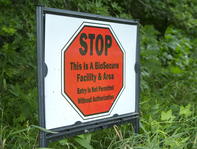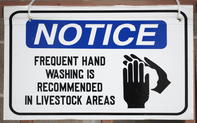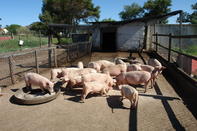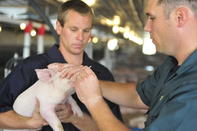What is Biosecurity for Pig Farmers?
Biosecurity for pig farmers is a set of measures or rules to prevent the introduction of diseases on a farm and the spread of diseases or pathogens within the farm.

Serious Pig Diseases in South Africa
Infectious diseases and many parasites can spread rapidly from pig to pig and from pigs to other animals. African swine fever (ASF) and foot and mouth disease (FMD) are examples of destructive diseases in pigs, which can cause huge losses. South Africa has both of these viruses in our national herd, causing great harm to the export market.
This would be worse if the government’s veterinary department did not maintain strict control over all aspects of national biosecurity in pig farming. There are regulations in the Animal Health Act that require animal owners to report unusual numbers of deaths in their herds to the nearest state veterinary office.
How are Pig Diseases Spread?

Infections spread from animal to animal in different ways, but mostly by close contact or contamination of the environment. Diseases and pathogens can also spread via feed or housing materials. But in most cases it is through contact with sick or dead animals, diarrhoea or coughing, sneezing, sharing the same piece of ground or water supply or infected foodstuffs. Infections can sometimes spread to remote sites or even countries by the exporting of meat and live animals.
Remember that infections and parasites will nearly always come from other pigs, people, shoes, feed, vehicles and pests. Some organisms live longer than others, some are destroyed by heat, disinfectants, pesticides or drying but it often takes repeated cleaning and time (several days) to be effective.
How to Create a Biosecurity System

The success of a biosecurity system lies with the pig farmers who understand that their pigs will not become infected if they are kept away from other pig herds. Biosecurity on pig farms can be implemented in the following ways:
Build a fence. Fence your property securely so that your pigs cannot get out or other pigs in the neighbourhood cannot get in. If your pigs are kept in a building, ensure that the waste, drainage from waste and cleaning water from the pig pens are dealt with inside your property. Use pig manure and bedding for composting, inside the fence of your farm.
Know where your pigs come from. Do not ever introduce new pigs into your herd from unknown sources and speculators. Even if they do not bring destructive diseases and parasites with them, there is a good chance that their ordinary pig problems will be a bit different from your own. Ask your state veterinarian or local animal health technician (AHT) for information.
Keep people away from your pigs. This includes neighbours, visitors, salespeople, butchers, speculators, inspectors and government officials. Anyone who has good reason to be on the farm and moves from farm to farm must be provided with overalls and disposable footwear (plastic overshoes are convenient and inexpensive) when they enter the farm.
These must be thrown away, after use, on the farm. Most people can conduct their business off the property. Vehicles used for loading pigs, off-loading feed or other materials can do so through a separate gate in the fence onto a ramp. This loading ramp should be of the right height for the vehicle linking up with the pig gangway on the inside.
Food and Medicine for Pigs

Pigs have big appetites and are not fussy about what they eat, but they will be healthier and grow faster if they are fed the right balanced pig feed from a co-op or feed company for at least half of their ration. When pig farmers want to feed ‘swill’ (left-over food, kitchen waste and food items past its ‘best before date’) then regulations require all ‘swill’ to be boiled for 60 minutes before being fed to pigs.
No animal or poultry residue should be fed at all. There are medicines and vaccines that have become part of routine pig-keeping and these can have a beneficial effect on production and health. These are mostly expensive and some require a veterinary prescription from a consulting veterinarian who has a good knowledge of your herd.
Where to Get Biosecurity Information
Information on pigs and pig farming in South Africa is usually available through the veterinary departments, the Pig Veterinary Society, SA Pork Producers' Organisation (SAPPO) as well as the agriculture departments in each of the provinces.
Please note: Information is for educational and informational purposes only and may not be construed as medical advice. The information is not intended to replace medical advice or treatment offered by your veterinarian.